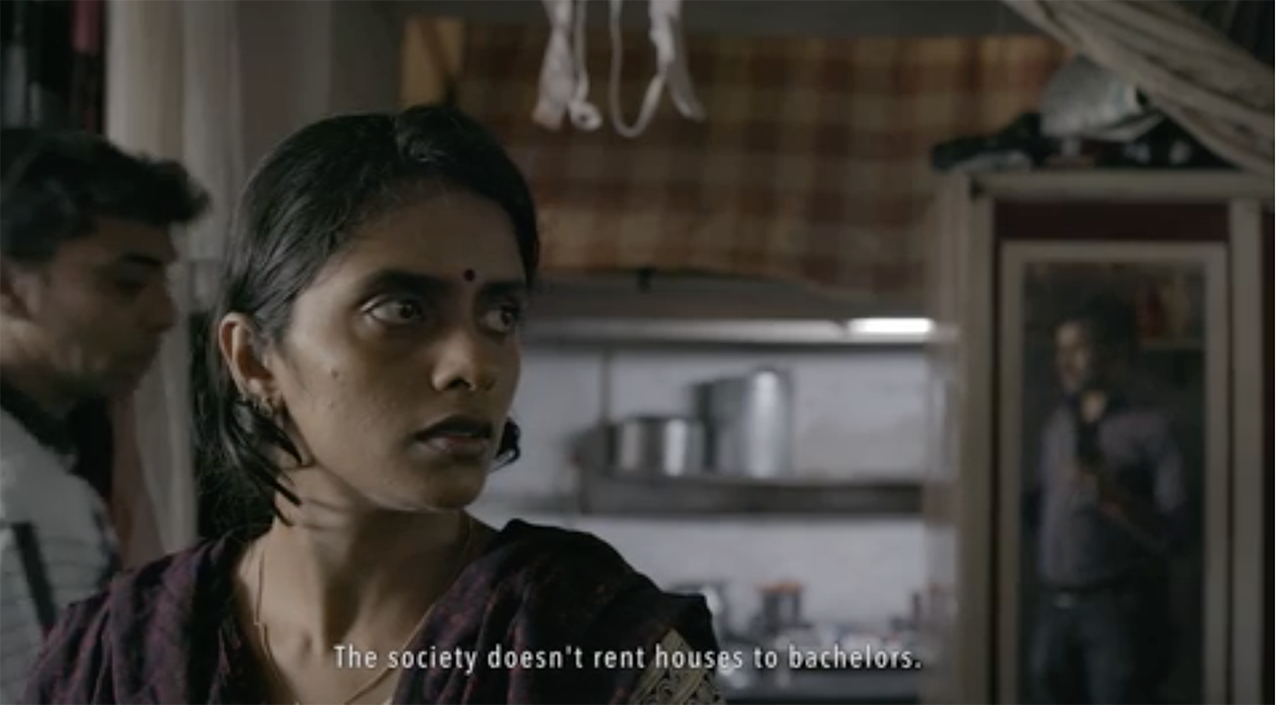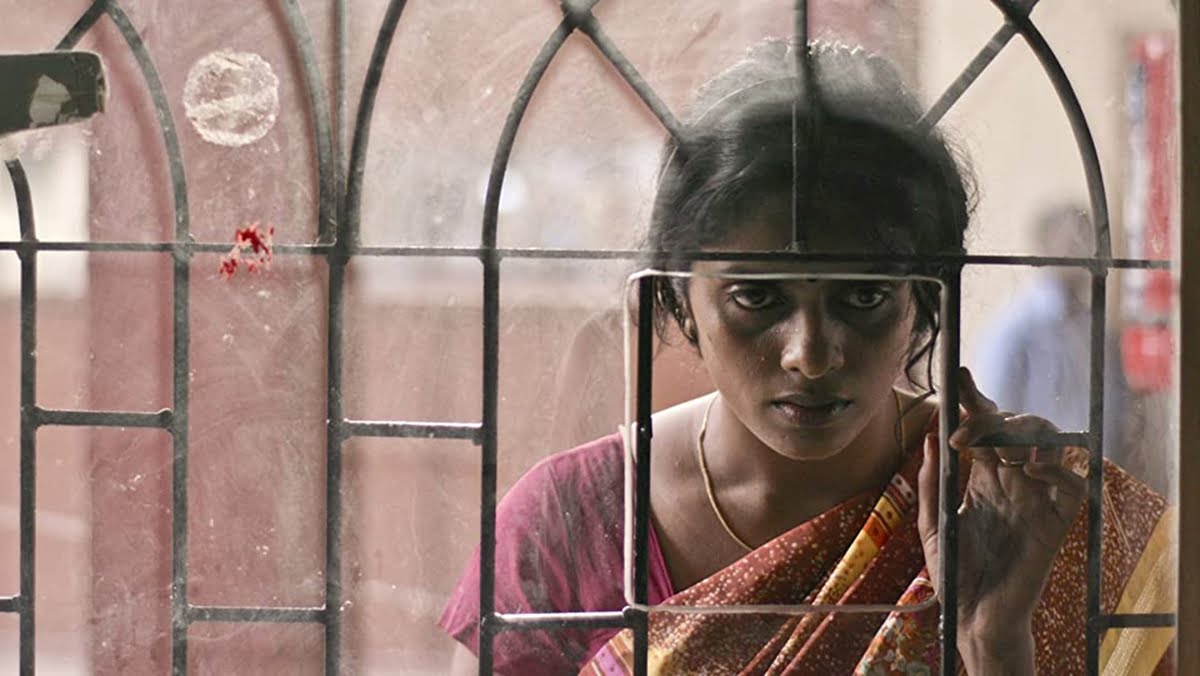The Sundance selected short film Counterfeit Kunkoo, directed by Reema Sengupta, is a powerful commentary on the redundancy of the Indian society to recognise marital rape as a crime. While the premise of the film is set around the issue of marital rape, Sengupta throws light on various issues at the intersection of women’s sexual agency within the institution of marriage. Counterfeit Kunkoo, the title of the film, calls for a swift interpretation. Sengupta uses the image of a kunkoo (vermilion spot on a married woman’s forehead) to communicate to us the suppression of women’s agency in heterosexual marriages.
The Sundance selected short film Counterfeit Kunkoo, directed by Reema Sengupta, is a powerful commentary on the redundancy of the Indian society to recognise marital rape as a crime. While the premise of the film is set around the issue of marital rape, Sengupta throws light on various issues at the intersection of women’s sexual agency within the institution of marriage.
The narrative of Counterfeit Kunkoo lays out such that Smita Sunil Nikam, the film’s protagonist, played by Kani Kusruti appropriates these instruments (mangalsutra and kunkoo) of subjugation to escape from the shackles of domestic oppression. Using these visuals throughout the narrative, Sengupta assigns a negative connotation to them. The semiotics reveal to us the honour and value attached to heterosexual marriage, becomes a pre-requisite for determining the merit of womanhood. Furthermore, by counterfeiting the role of a wife, Smita ridicules the institution of marriage for her autonomy and liberation.
Also read: Locating Queer Vocabulary In Literature & Cinema

Smita Nikam is a middle class woman, who lives alone in the chawls of Mumbai. The story tells us that Smita had recently separated from her husband Sunil Nikam (Vijay Verma) whom she accuses of raping her. With no legal aid for justice, Smita manages to isolate herself from her perpetrator. This also draws attention to the fact that there little or no legal support to the idea of rape within marriage. On the contrary, the legality of marriage within India is founded on the act of “consummation”, while the inability to have sex provides grounds for its annulment. Most importantly, the husband has the right to demand “restitution of conjugal rights” or take the support of the State to get sexual access to his wife who may be unwilling to participate in sexual relations.
Thus, the absence for any legal redressal for marital rape has been compounded by social attitudes that fail to recognise that there could be grounds for lack of consent within the marriage. The societal attitude also provides both legal and social impunity to men accused of rape in a marriage. Sengupta encapsulates this in a particular scene in Counterfeit Kunkoo where Sunil ridicules Smita for accusing him of rape. Further, we also see that Smita does not adopt any legal recourse against the crime which speaks largely of how the society perceives the issue of rape within the construct of marriage.
A large part of the film focuses on the aftermath of the sexual violence, depicting Smita’s struggle and frustration while finding a separate accommodation for herself. Smita is a taciturn woman who earns her living by threading imitation mangalsutras. Hence, despite being an ideal tenant, Smita faces housing discrimination because of her gender and marital status. Smita’s single status after separating from the husband compel her to leave her previous accommodation and forces her to find a new one.

Her cathartic experiences of finding a flat in the areas of Malad East of Mumbai lay bare the housing discrimination and social stigma unwillingly conspired against a separated woman. Smita, who holds enough resolve to discard her violent husband and is financially independent, scrambles to find an accommodation just because her husband isn’t standing next to her acting as a ‘character certificate’.
Counterfeit Kunkoo reiterates how marriage becomes a precondition for women to seek respect within the society. The notion of a woman to be considered ‘complete’ only after she is married is at the background of various scenes throughout the film. It also indicates to us the unequal gendering and significance attributed to the marital status of women, equating their worth to the heteronormative imperatives of an ‘ideal woman’ in India.
Throughout the short film, Sengupta employs an element of a ‘ringing doorbell’, a symbol for reinforcing misogyny in Smita’s everyday life. By showing the cyclic occurrence of a ringing doorbell following which the broker introduces a client to Smita’s house, the director builds on her rage and vulnerability from the failure of finding another accommodation. In the process of house hunting, Smita encounters sexism and misogyny from various brokers and building owners that remind her of marital status. Thus, at every crossroad, Smita is provided with unsolicited reminders of her so-called personal insufficiency as a single woman.
In the opening scene of Counterfeit Kunkoo , Sunil is shown accompanying Smita to the hospital for an abortion. The scene reveals to us the insecurities and vulnerabilities of a rape survivor in the presence of their offender. Similarly, in yet another scene, we witness a similar anxiety and tension when Smita pulls back her bare feet into under her saree fold, clenching onto her knees in defence to Sunil’s presence in the same room as hers. Her body language is impactful and communicates to us the emotional agony of a rape survivor. The scene also comments on the impunity cis-het men obtain after committing a heinous crime like rape in India.
Also read: Mothers In Malayalam Cinema: From Ideal Care Givers To Individuals With Boundaries

Furthermore, Sengupta wields two objects, the mangalsutra and the kunkoo throughout Counterfeit Kunkoo , delivering powerful visuals that aid the narrative of the story. Her prolific direction is witnessed during a climax scene when Smita resiliently washes off the kunkoo from her forehead, after she forges her marriage for procuring a flat. Another aberration is followed in the sequence when Smita vigorously masturbates in order to reclaim her sexual agency from a violent husband. The sight of female pleasure and autonomy is employed to signify Smita’s liberation from the fetters of an abusive marriage.
The sequence also opens conversations around female sexual pleasure and why women need to educate themselves about it. The taboo around female sexuality and pleasure perpetuate negative stereotypes that prevent women from talking about their sex lives candidly. The failure to do so, among other things, makes women complacent in abusive marriages, submitting to the hegemony of consent and coercion in a patriarchal set up. This particular scene breaks free from such ideas and is empowering in the sense that it demands women to take charge over their body and assert their sexual freedom, independent from the construct of a marriage.
Smita’s quest for finding a new house also informs us the significance of spaces in the process of healing from trauma. The intricacies of domestic relationships are such that it prevents women from accessing safe spaces that can provide them with both emotional and physical security. In that case, survivors of rape in marriage are forced to co-exist with their abuser, which further exacerbates their trauma. For most women, domestic spaces become sites where trauma is perpetuated and reinforced. Thus, accessing safe spaces becomes a matter of social and economic privilege. Additionally, what outshines an overwrought script is the confident visual language. In one of her interviews, Sengupta tells us that “the quadrant angles shot in a 16:9 frame highlight Smita’s relationship with spaces. Thus, the woman is cornered and boxed-in, unable to claim her space even in a frame.”
In a particular sequence in Counterfeit Kunkoo , we also witness that Smita is denied support from her natal household. This is because in a deeply patriarchal structure of a family, sexual coercion is an indistinguishable part of the entire spectrum of unfreedom and coercions which define the family. Consent, coercion, duties, demands and rights are inextricably intertwined that it becomes impossible to target one without undermining the other. A middle class natal household in India cannot afford to undermine and challenge this construct, withdrawing any form of support and care to the female survivor.
Films like Reema Sengupta’s Counterfeit Kunkoo and Jeo Baby’s The Great Indian Kitchen deliver us stories that aren’t feist feminist accounts of women empowerment. Rather, these stories are based in the idiosyncrasies of patriarchy, manifested in ground circumstances of middle class reality.
Lastly, films like Reema Sengupta’s Counterfeit Kunkoo and Jeo Baby’s The Great Indian Kitchen deliver us stories that aren’t feist feminist accounts of women empowerment. Rather, these stories are based in the idiosyncrasies of patriarchy, manifested in ground circumstances of middle class reality. Counterfeit Kunkoo is promising and honest in its depiction, charging its audience with an amount of culpability against the harsh realities of women in India.
Featured image source: Amazon
About the author(s)
Mansi Bhalerao is an Ambedkarite feminist, an undergraduate at Miranda House. She is an aspiring student of Sociology, trying to navigate and assert her praxis.



